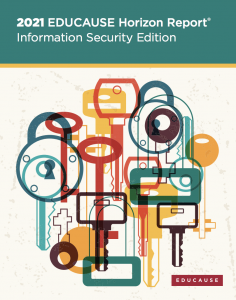Information Technology Services (ITS)
Marden Paul joins global panel for EDUCAUSE 2021 Horizon Report
Published on: March 15, 2021

The 2021 EDUCAUSE Horizon Report, Information Security Edition, was informed by a panel of 50 experts, including Marden Paul, U of T’s Director of Planning Governance Assessment, Office of the Chief Information Officer.
A new report intended to assist higher education institutions learn, plan and act on trends and threats as they relate to security and data privacy was released by EDUCAUSE on Feb. 16, 2021.
2021 Horizon Report
The 2021 EDUCAUSE Horizon Report, Information Security Edition looks at key technologies and practices shaping the future of information security, anticipating a number of scenarios and implications. The information and research presented is based on the perspectives and expertise of an international panel of leaders from across the higher education landscape, including the University of Toronto (U of T).
Though the Horizon Report has been issued for many years, this was the inaugural information security edition. It was a critical topic to cover in 2020 as the dramatic shift to remote work — designated an “uber” trend in the report — during the COVID-19 pandemic resulted in an increase of institutional security and privacy threats from bad actors.
Expert panel
Marden Paul, U of T’s Director of Planning Governance Assessment, Office of the Chief Information Officer, was one of 50 higher education experts from around the globe who made up the 2021 Horizon panel.
Paul has been actively involved in EDUCAUSE — a non-profit association focused on advancing higher education through the use of information technology — for more than 20 years. He was invited to join the panel in June 2020 and worked on the report between July 2020 and January 2021.
“Being from U of T, there is an opportunity to bring views from a very large, complex, research-intensive university to the conversation,” said Paul. “It’s important to bring international viewpoints and realities to these reports because regulatory systems and policies differ from those in the U.S.; reports and recommended practises that appear inside may not reflect realities in Canada or elsewhere.”
For the report, the role of the panelists was to vote on the most important trends spanning five categories: social, technological, economic, environmental and political. According to Paul, it was a well-structured approach — combining higher education representatives with the EDUCAUSE project team.
“The process commenced with relatively free-form input on issues, followed by conversations and voting,” he explained. “Topics are then further developed and additional conversation and voting occurs. In between panel interactions, the EDUCAUSE staff analyze the input and extract the key issues and concepts.”
The methodology used to develop the report was created by the Institute for the Future. It focused on five core principles: forget about predictions, focus on signals, look back to see forward, uncover patterns and create a community.
“The opportunity to work with people from other organizations and with different positions and perspectives is intellectually exciting and challenging,” said Paul. “I’d highly recommend becoming involved in these types of activities with EDUCAUSE.”
To learn more, visit the EDUCAUSE website here.

